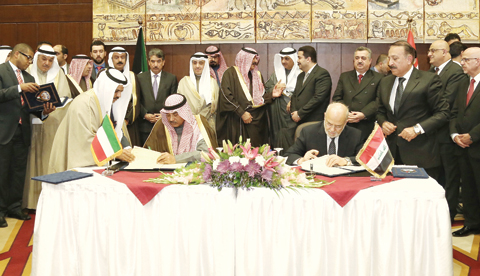Kuwait to start importing gas from Iraq
 BAGHDAD: Kuwait's First Deputy Prime Minister and Foreign Minister Sheikh Sabah Al-Khaled Al-Hamad Al-Sabah (left) and Iraqi Foreign Minister Ibrahim Al-Jaafari sign an agreement during the sixth session of a joint Kuwaiti-Iraqi ministerial committee yesterday. - KUNA
BAGHDAD: Kuwait's First Deputy Prime Minister and Foreign Minister Sheikh Sabah Al-Khaled Al-Hamad Al-Sabah (left) and Iraqi Foreign Minister Ibrahim Al-Jaafari sign an agreement during the sixth session of a joint Kuwaiti-Iraqi ministerial committee yesterday. - KUNABAGHDAD/KUWAIT: The sixth session of a joint Kuwaiti-Iraqi ministerial committee convened in the Iraqi capital yesterday, with participation of a Kuwaiti delegation headed by First Deputy Prime Minister and Foreign Minister Sheikh Sabah Al-Khaled Al-Hamad Al-Sabah. On the Iraqi side, the delegation was headed by Iraqi Foreign Minister Ibrahim Al-Jaafari. Official discussions were held during the a two-day meeting over increased cooperation between both nations.
The Kuwaiti foreign minister traced the history of bilateral ties, noting that such meetings are imperative to meet the collective aspirations of the peoples of both nations. Moreover, he underscored Kuwait's firm support of Iraq in the country's fight against terrorism, noting that concerted efforts are required to exterminate this scourge. At the conclusion of the session, a series of four agreements were signed between both countries, dealing with culture, industry, security and aviation. Kuwait's delegation to the joint Kuwaiti-Iraqi ministerial committee's session included senior officials from the country's government and private sectors.
During the concluding session, the Iraqi foreign minister recalled the good positions and support of HH the Amir of Kuwait Sheikh Sabah Al-Ahmad Al-Jaber Al-Sabah towards Iraq during difficult circumstances since 2003. He thanked Kuwait for its backing of Iraq in its war against the so-called Islamic State (IS), for its condemnation of terrorist attacks in Iraq, for its swift response to requests to join efforts to extinguish oilfield fires in the country, and for its agreement to delay due compensations.
Jaafari congratulated Kuwait on the election of the new parliament and formation of a new government, wishing it everlasting security, stability and welfare. He pointed to Iraq's willingness to develop cooperative relations with Kuwait in economic and oil domains according to memos of understanding and agreements signed by both nations. He reiterated his country's commitment to following up on the file of Kuwaiti prisoners and missing persons in spite of being fully preoccupied with its ongoing war on terrorism, in addition to the current financial crisis.
Sheikh Sabah Al-Khaled said Kuwait is a member of the international coalition against IS in a sign of support to Iraq's anti-terrorism efforts, unity and stability. Congratulating Iraq on the liberation of territories from the control of IS, the Kuwaiti minister said his country has provided Iraq with humanitarian aid worth $200 million, covering the humanitarian needs of Iraqi internally displaced persons, including $18 million in urgent humanitarian aid. He added that Kuwait had also offered $176 million during a donors' conference held in Washington on July 20. Sheikh Sabah also hailed the maritime navigation agreement signed by both countries in December.
Meanwhile, Kuwait is set to begin importing up to 200 million cubic feet of gas daily from Iraq, oil ministers from the two nations said after talks yesterday. Iraqi Oil Minister Jabbar Al-Luaibi said the project "will see the light very soon". Kuwaiti Oil Minister Essam Al-Marzouk said the quantities have been agreed and the start date will be determined after technical committees fix prices and shipping methods. Marzouk said an initial 50 million cubic feet daily will rise gradually to 200 million cubic feet a day.
OPEC member Kuwait is rich in crude oil but poor in gas resources, and has imported gas for years during the summer months to meet demand. Luaibi said they also discussed production from border oilfields and agreed to form a committee and appoint a consultant. The Iraqi minister said without elaborating that the two nations do not have any differences. Kuwait and Iraq had agreed in Aug 2010 "in principle" on a deal to regulate production from the frontier oilfields that once caused conflict between them. But that agreement, which called for a unified international company to drill for oil on the border, was not finalized.
Former Iraqi leader Saddam Hussein's troops invaded and occupied Kuwait in Aug 1990 following claims over the border oilfields. A number of oilfields lie on the frontier, including Iraq's giant Rumaila field, which extends into Kuwait, where it is known as Ritqa. - Agencies










